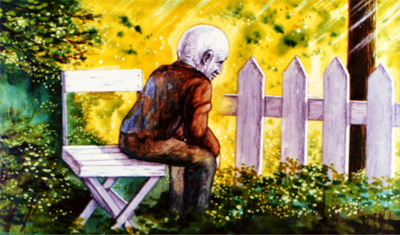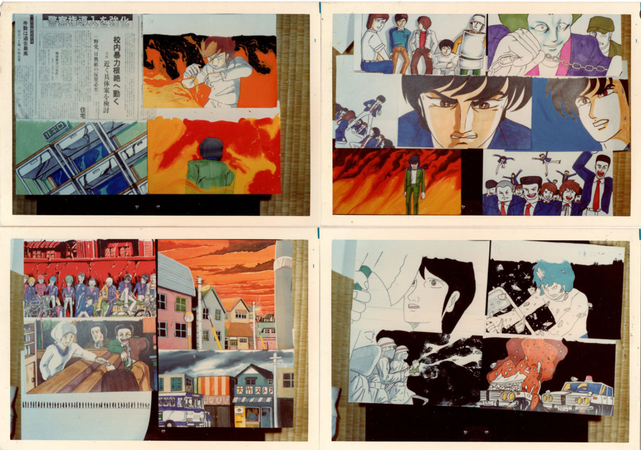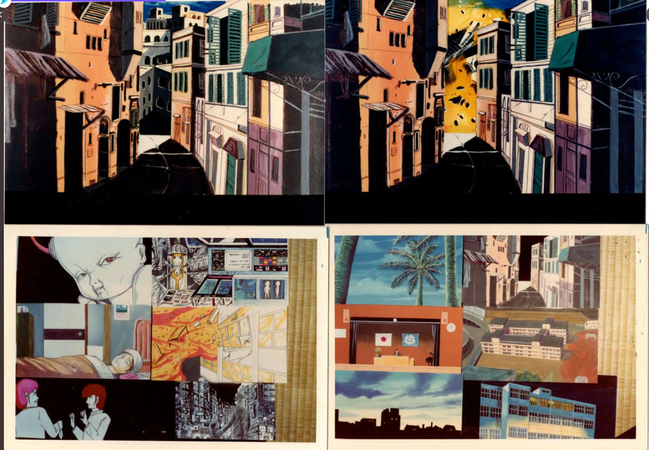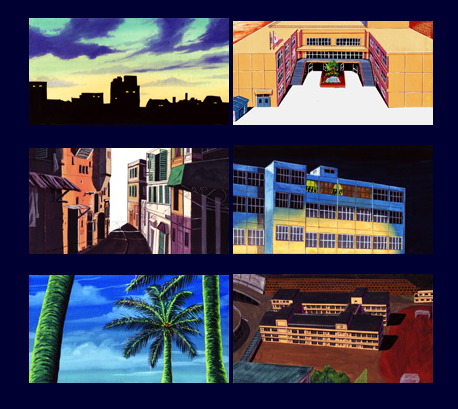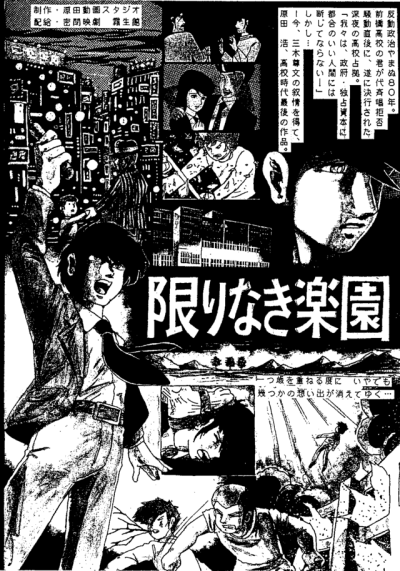Kagirinaki Rakuen (found amateur Hiroshi Harada anime film; 1981)
Kagirinaki Rakuen (限りなき楽園), or in English and better known as Limitless Paradise, is a 40-minute[1] amateur anime film directed, animated and made completely by Hiroshi Harada in 1981[1][2], an animator notoriously known for his works in the "ero-guro" genre and for his controversial film, Midori.[1]. It was then screened in the following years in 1982, 1986 and lastly in 1988[1] and since then, has never been shown publicly and released in any form.
Plot
Harada had explained a brief rundown of the film[1] that came from his blog which contains most of the information about Kagiriniki Rakuen. The rundown goes as follows:
高校生達が学校への不満から、高校を占拠し立てこもる。 しかし明確な方針や理念を持たなかった生徒達は やがて分裂を起こしてバラバラになってしまうというストーリー。
When translated in English, it goes as follows:
High school students occupy the high school out of dissatisfaction with the school. However, the story is that the students who do not have a clear policy or philosophy eventually split and fall apart.
Content
Aside from a rundown of the film's plot, there are three songs that are confirmed to have been used in the film[1], one is a song entitled "Child's Mind", an original song which was written and sung by Takafumi Miki (Harada's friend), and arranged by Harada himself.[3] Another song, entitled "St. Louis Blues", an original song by Harada's cousin[1], and Tchaikovsky's Symphony No. 4.[1] Additionally, Harada had composed an original score for the film that he had written when he was 16, entitled in the same name as his film "Limitless Paradise", using a Porta Sound, a Yamaha DX100, and an RX2.[4]
Availability
Aside from a few screenings of the film in 1982, 1986, and lastly in 1988[1], the film was never shown publicly again. Though, Harada himself had expressed embarrassment and contemplation about the film's release[4][1][5]. Additionally, with the original 8mm film strip being heavily damaged, it is likely to take Multiple advertisements for the film have been uploaded by different users and is available online.[6]
On December 22nd, 2020, Harada's new production company, Kiriokan, confirmed on their official Twitter account, @kiyubaru, that the film's plot depicts school struggles such as clashes between high school students and riot police.[7] Additionally, the thread also gives more information on Harada's early works and also gives more drawn stills of the film[7], and footage from the film that had been re-shot.[8][9].. This has been the only resurfaced footage of the film as of 2022, albeit re-shot.
Gallery
Footage
Stills
Advertisements
Songs
Videos
External Links
- AnimeNewsNetwork page about Hiroshi Harada and his works.
- Hiroshi Harada's blog site and portfolio.
- Hiroshi Harada's production company, Kiriokan''s official page.
- MyAnimeList forum thread on Limitless Paradise
- r/LostMedia post and thread on Limitless Paradise
- Another r/LostMedia post and thread on Limitless Paradise
- LMW Forums thread on Limitless Paradise
References
- ↑ 1.0 1.1 1.2 1.3 1.4 1.5 1.6 1.7 1.8 1.9 Limitless Paradise' entry on Hiroshi Harada's official blog site.
- ↑ MyAnimeList page on Limitless Paradise
- ↑ "Child's Mind" description that credits Harada and Miki.
- ↑ 4.0 4.1 Haraada's blog post about his original score "Limitless Paradise".
- ↑ Kiriokan's Twitter Status on Harada's thoughts on having Limitless Paradise release
- ↑ Tumblr blogpost on Limitless Paradise advertisement
- ↑ 7.0 7.1 Kiriokan's Twitter Status about Limitless Paradise.
- ↑ Kiriokan's Twitter Status on the re-shot footage of the film.
- ↑ Archive.org link on the footage from Kiriokan's official channel,
